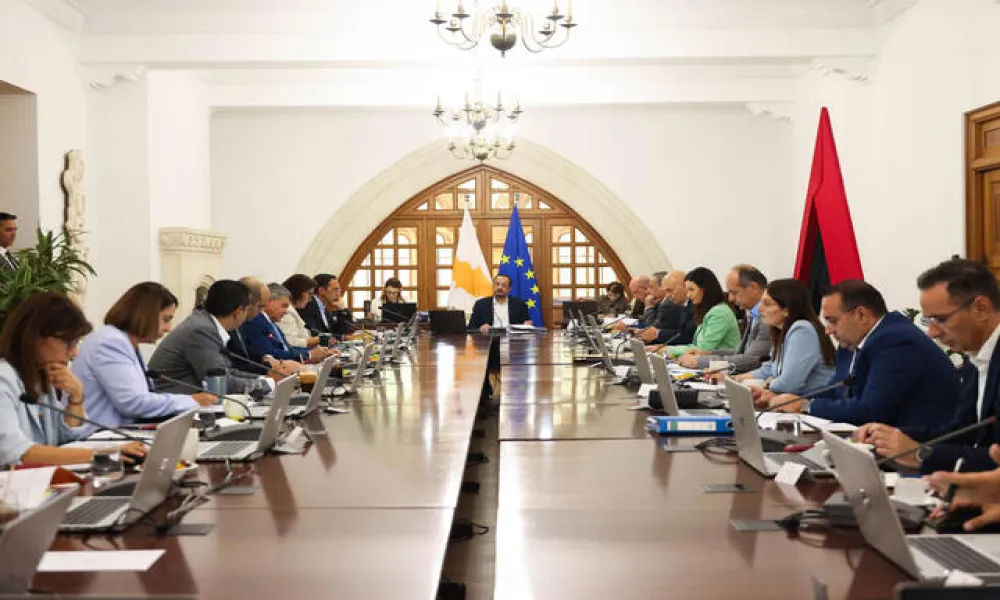By Christos Georgiou
President Nikos Christodoulides, backed by a circle of close advisers, has now finalized his thinking on an imminent Cabinet reshuffle, expected within weeks, if not days. This is the clear signal emerging from the Presidential Palace, where both the scope of the shake-up and the fate of individual ministers are already being mapped out.
According to the latest reporting, the plan points to a straightforward logic, what some at the Palace call “common sense”: a reshuffle driven by the practical performance of ministers, separating those who have earned their place from those who will almost certainly be replaced.
In the broader context, given the government’s current circumstances, a reshuffle can no longer be seen as a mere corrective adjustment — it must be understood as an act of pure political survival.
The group that will stay
Based on all available indications, there is a core group of ministers who are categorically excluded from the reshuffle. Barring an extraordinary surprise, these individuals will continue to hold their portfolios:
-
Foreign Minister Constantinos Kombos
-
Interior Minister Constantinos Ioannou
-
Education Minister Athina Michaelidou
-
Defence Minister Vasilis Palmas
-
Health Minister Michalis Damianou
-
Deputy Minister for Migration Nikolas Ioannidis
According to the President’s intentions, these ministers form a core executive team with responsibility for crucial pillars of government policy. Their performance has not negatively affected public perceptions of the President, who entered office with strong social backing and the promise of a “new model of governance.”
Makis and Irini
A special case is Finance Minister Makis Keravnos. The President would like him to stay, but Keravnos himself has repeatedly indicated his desire to leave. Combining technocratic expertise with political experience, he remains an ideal figure for the government, but he continues to signal his intention to resign. For the President, replacing the Finance Minister would be a highly difficult step. As for Deputy Minister of Fiscal Policy Irini Piki, moving her into the Finance Ministry is considered unlikely, given her current workload.
The vulnerable
Another group consists of ministers and deputy ministers considered “at risk” or vulnerable in this reshuffle. They are not certain to be dismissed, but their positions are shaky:
-
Labour Minister Andreas Panayiotou
-
Transport Minister Alexis Vafeades
-
Deputy Minister for Tourism Kostas Koumis
-
Deputy Minister for Research, Innovation & Digital Policy Nikodimos Damianou
-
Culture Minister Vasiliki Kassianidou
The departing
The third category consists of those widely expected to leave the Cabinet, considered weak links in the government:
-
Justice and Public Order Minister Marios Hartsiotis
-
Agriculture and Environment Minister Maria Panayiotou
-
Energy Minister George Papanastasiou
-
Deputy Minister for Welfare Marilena Evangelou
Based on current information, beyond the first group of ministers deemed “safe,” surprises cannot be ruled out in the other two categories, as the President considers broader changes.
A matter of political survival
Any Cabinet reshuffle, the President believes, must carry “added value”, to use a phrase he often repeats, and cannot merely be a cosmetic adjustment. At this stage, it is about political survival.
Political imprint
It is widely acknowledged, even among the President’s supporters, that after 30 months in power the government has yet to establish a clear political imprint. It has not advanced a coherent strategy or implemented flagship policies tied to Christodoulides’ own vision. Citizens sense a lack of direction, cohesion, and narrative about “where we are going” and “how we’ll get there.”
Thus, the President is increasingly convinced that what is needed is not just a “facelift” of faces but a realignment with figures of political weight and social legitimacy. This may lead him back to recruiting personalities from the political forces that supported his election, while also intensifying outreach into the DISY camp. Ultimately, what matters most for Nikos Christodoulides is regaining momentum for the 2028 presidential elections.
Safe to remain
Constantinos Kombos (Foreign Affairs)
Constantinos Ioannou (Interior)
Athina Michaelidou (Education)
Vasilis Palmas (Defence)
Michalis Damianou (Health)
Nikolas Ioannidis (Migration Deputy Minister)
Under review
-
Makis Keravnos (Finance Minister – wants to resign, President wants him to stay)
-
Irini Piki (Fiscal Policy Deputy Minister – unlikely to be moved)
Vulnerable
-
Andreas Panayiotou (Labour)
-
Alexis Vafeades (Transport)
-
Kostas Koumis (Tourism Deputy Minister)
-
Nikodimos Damianou (Innovation, Research & Digital Policy Deputy Minister)
-
Vasiliki Kassianidou (Culture)
Departing
-
Marios Hartsiotis (Justice & Public Order)
-
Maria Panayiotou (Agriculture & Environment)
-
George Papanastasiou (Energy)
-
Marilena Evangelou (Welfare Deputy Minister)
